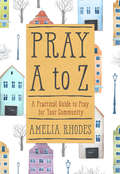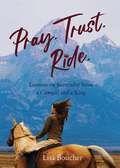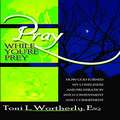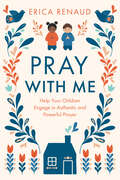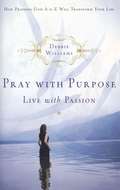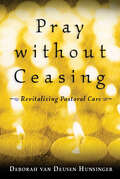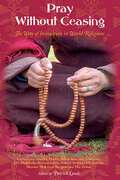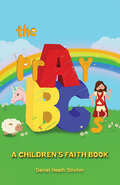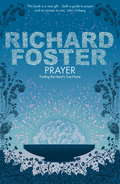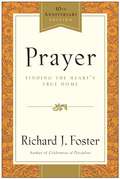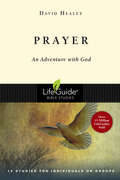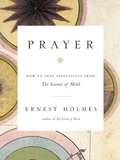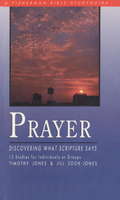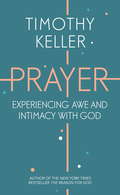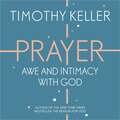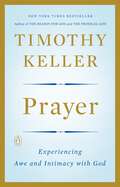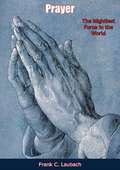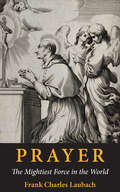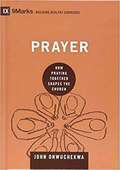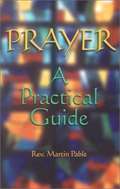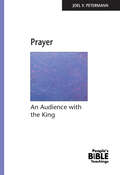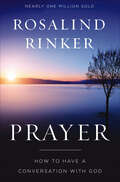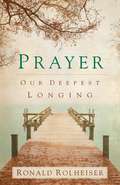- Table View
- List View
Pray A to Z: A Practical Guide To Pray For Your Community
by Amelia RhodesPray A-Z: A Practical Guide to Praying for Your Community will help you topically organize your prayer requests and lay the burdens of your community at the feet of our Heavenly Father. Whether you are praying for a friend's adoption journey, a neighbor's bankruptcy, or a family member's cancer, this book will give you Bible verses, prayer prompts, and prayer starts to guide you through praying for even the most difficult issues that affect the people you know and love. Perfect for either individual or group prayer, Pray A-Z will help you experience the peace that comes from communicating with God.
Pray. Trust. Ride: Lessons on Surrender from a Cowgirl and a King
by Lisa BoucherPray. Trust. Ride: encourages you to stay in the saddle and ride through life with a looser rein. We live more fully when we can let go— even when all looks bleak and our brains scream, Hang on and do something! Do anything! Fix this! Stop that! The truth is, those problems that strangle our hearts are the sort of problems that we can&’t fix. King Jehoshaphat understood that when he was boxed in by his enemy; at his most vulnerable moment, he leaned on God and let go of the outcome. Using this approach as her guiding principle, Lisa Boucher shares in this helpful guide how to lean on spiritual principles to help people live with less anxiety and strife, and how letting go allows us to accept that we can&’t solve all our problems; we can&’t save others from themselves; we can&’t stop the inevitable from happening. What we can do is let go and trust that God has our backs.
Pray While You're Prey: How God Turned My Loneliness and Frustration into Contentment and Commitment
by Toni WortherlyBeing single is not a prison sentence. It is not a cage that holds you captive. In fact, it is the ultimate freedom. It is freedom to discover God’s will for your life, to live a fulfilling life. It is the ability to run free in this jungle of a world, knowing that when the time is right, a good hunter will snare you and hold you captive, while God reveals a new purpose for you. If anyone had said these things to me, even while I was writing this book, I would not have believed it, but God led me on a journey. A journey from frustration to contentment. A journey from loneliness to commitment. Not the commitment with a man that I thought I longed for, but a commitment to Christ that my soul yearned for. I stopped chasing a dating dream and started serving a risen reality. God revealed things that I needed to change about me, the types of hunters that exist, the ones that are best for me, how to escape a predator called loneliness, and have a Godly relationship once I’m captured. And I know that God didn’t just lead me on the journey for me; He intended for me to share my journey with others.
Pray with Me: Help Your Children Engage in Authentic and Powerful Prayer
by Erica RenaudThis grace-filled, practical book on praying with your kids empowers you to teach children how they can develop a personal relationship with God through prayer. As parents, our deep longing is for our children to not just know about Jesus but to love Him. In Pray with Me, parent and ministry leader Erica Renaud shows us how inviting kids into the joy of intentional prayer—on their level—nurtures authentic relationship with God that can last a lifetime. Through relatable stories, biblical insight, and practical tips for involving the whole family in prayer, Erica equips us to: Overcome the challenges of praying with kids by learning how to engage their hearts.Encourage prayer in response to everyday joys and struggles.Get creative about when, how, and what to pray.Express the theology of prayer in age-appropriate language, for preschoolers to tweens.Let go of the insecurity that keeps us from praying with our kids. As our children grow spiritually, we can too—and together, love Jesus more every day.
Pray with Purpose, Live with Passion: How Praising God A to Z Will Transform Your Life
by Debbie WilliamsIn this reflective guide, Debbie Williams walks you through the discipline and relationship of prayer—a new life of passion and purpose awaits you.With an enthusiastic invitation to use her book as an interactive guide to deepen the reader's prayer, Debbie Williams sets out to redirect the focus from us to God, who is divine, and who can accomplish all things. Using the acronym PRAY for Praise, Repent, Ask, and Yield, she encourages a study of God's attributes with an A-Z exploration which ranges from Almighty to Zealous God. Each chapter reveals more of who God is and how He alone is capable to meet our every need as we recognize who He truly is.
Pray without Ceasing: Revitalizing Pastoral Care
by Deborah van HunsingerTaking seriously Paul’s exhortation in 1 Thessalonians to “pray without ceasing,” Deborah van Deusen Hunsinger challenges pastors and congregations to put prayer at the center of their Christian practice and theological reflection. In this thought-provoking book Hunsinger reclaims spiritual practices from token use and unites them in a dynamic network of interdependent caring traditions. The book begins with the three foundational disciplines of spiritual reading, careful listening, and self-reflection. Hunsinger then explores prayers of petition, intercession, confession, lament, and thanksgiving. Finally she offers practical, workable suggestions for developing pastoral care groups and teaching care-giving skills at the congregational level. Clergy and laity alike will reap the benefits of this revitalizing look at the spiritual disciplines as dynamic forces in the life of the church.
Pray Without Ceasing: The Way of the Invocation in World Religions
Drawn from the world''s religions, this work takes the reader on a pilgrimage to the heart of prayer and reveals why prayer is the essence of the human condition.
The prAyBCs: A Children's Faith Book
by Daniel Heath StrohmWhether they know their ABCs yet or not, The prAyBCs will be a delight to young Christians and non-Christians alike.Their parents and/or guardians will have fun reading along with the children as well and may notice The LORD&’s prayer is included in its entirety throughout the reading of the alphabet.Our hope is that The prAyBCs will strengthen people&’s faith and relationship with God in a fun and enjoyable way for years to come.
Prayer: Nurturing Your Relationship with God
by Richard J. BeckmenA guide for new Christians to understanding and practicing prayer.
Prayer: Finding the Heart's True Home
by Richard FosterThis book is a comprehensive, profound and immediately accessible book which opens the way for all to increase their understanding and develop their practice of prayer. Richard Foster explores the riches of the historical classics of prayer as well as his own personal experience. No one who reads Prayer will remain unmoved; all will find encouragement within its pages.
Prayer: Finding the Heart's True Home
by Richard FosterThis book is a comprehensive, profound and immediately accessible book which opens the way for all to increase their understanding and develop their practice of prayer. Richard Foster explores the riches of the historical classics of prayer as well as his own personal experience. No one who reads Prayer will remain unmoved; all will find encouragement within its pages.
Prayer: Finding the Heart's True Home
by Richard J. FosterExplores the three "movements" of this central spiritual practice, offering a sensitive, warm, and compelling primer that helps us understand, experience, and follow its many forms. Foster clarifies the prayer process, answers common misconceptions, and shows the way into prayers of contemplation, healing, blessing, forgiveness, and rest. This accessible, rich, and reliable guide shows how each of the various forms of prayer can move us inward into personal transformation, upward toward intimacy with God, and outward to minister to others.
Prayer: An Adventure with God (LifeGuide Bible Studies)
by David HealeyYou pray for your own needs and for the needs of others. You pray in the face of conflict, and you pray for forgiveness. You pray to pour out your heart to God and to gain a glimpse of God's heart for you. As David Healey leads you through twelve-session LifeGuide Bible Study, the prayers of men and women in the Bible (Mary, Abraham, Moses, Daniel and more!), you will gain new insights into why, what and how to pray. And you will experience more fully the adventure that prayer can be. Now available in IVP's revised LifeGuide Bible Study format, Prayer features questions for starting group discussions and for personal reflection, as well as a new "Now or Later" section following each session. PDF download with a single-user license; available from InterVarsity Press and other resellers. For over three decades LifeGuide Bible Studies have provided solid biblical content and raised thought-provoking questions—making for a one-of-a-kind Bible study experience for individuals and groups. This series has more than 130 titles on Old and New Testament books, character studies, and topical studies.
Prayer: How to Pray Effectively from the Science of Mind
by Ernest HolmesCombining the most essential principles about prayer with the dozens of prayers and meditations from Ernest Holmes's classic text, The Science of Mind, this new book, Prayer, is a simple introduction for anyone who wants to learn how to pray effectively. "What does one do when he prays?" writes Holmes. "He talks to God. Where does he talk to God? He talks to God in his own mind, through his own thought or feeling. " .
Prayer
by Timothy Jones Jill ZookWant More for Your Prayer Life!Few areas of the Christian life inspire more resolutions--or create more guilt--than prayer. Most of us share the longing expressed by Jesus' disciples, "Lord, teach us to pray." Like them, we see a depth and reality in Jesus' relationship with the Father that makes us restless for something more. The wonderful news is that Scripture is filled with guidance for talking with God. As we study and apply its teaching, our own prayer life will become intimate and fruitful, daily growing more like the prayers of Jesus. 12 Sessions for Individuals or GroupsFisherman Bible Studyguides include: . Penetrating questions that generate discussion. . Flexible format for groups or individual needs. . Helpful leader's notes.. Emphasis on daily application of Bible truth.
Prayer: Experiencing Awe and Intimacy with God
by Timothy Keller'"Can't anyone teach me how to pray?" Millions of people today are asking the same question. There is a sense of the necessity of prayer - we have to pray. But how?'Prayer is central to Christian faith; indeed, as Timothy Keller notes in his introduction, it is the main way we experience deep change. Yet so many people struggle with prayer - a struggle that the author himself has shared. This wise and inspiring book is the fruit of those struggles, offering a real and glorious vision of what it can mean to seek God in prayer. Keller begins by giving a theological underpinning of what prayer actually is - both conversation and encounter with a personal God - before describing how we can learn to pray, and then deepen that prayer. Finally he gives detailed, practical suggestions on how to make prayer a part of the reality of daily life.
Prayer: Experiencing Awe and Intimacy with God
by Timothy Keller'"Can't anyone teach me how to pray?" Millions of people today are asking the same question. There is a sense of the necessity of prayer - we have to pray. But how?'Prayer is central to Christian faith; indeed, as Timothy Keller notes in his introduction, it is the main way we experience deep change. Yet so many people struggle with prayer - a struggle that the author himself has shared. This wise and inspiring book is the fruit of those struggles, offering a real and glorious vision of what it can mean to seek God in prayer. Keller begins by giving a theological underpinning of what prayer actually is - both conversation and encounter with a personal God - before describing how we can learn to pray, and then deepen that prayer. Finally he gives detailed, practical suggestions on how to make prayer a part of the reality of daily life.(P)2014 Penguin Audio
Prayer: Experiencing Awe and Intimacy with God
by Timothy KellerRenowned pastor and New York Times bestselling author of The Songs of Jesus Timothy Keller explores the power of prayer. Christians are taught in their churches and schools that prayer is the most powerful way to experience God. But few receive instruction or guidance in how to make prayer genuinely meaningful. In Prayer, renowned pastor Timothy Keller delves into the many facets of this everyday act. With his trademark insights and energy, Keller offers biblical guidance as well as specific prayers for certain situations, such as dealing with grief, loss, love, and forgiveness. He discusses ways to make prayers more personal and powerful, and how to establish a practice of prayer that works for each reader. Dr. Keller's previous books have sold more than one million copies. His Redeemer Presbyterian Church is not only a major presence in his home base of New York, it has also helped to launch more than two hundred fifty other churches in forty-eight cities around the world. His teachings have already helped millions, the majority of whom pray regularly. And with Prayer, he'll show them how to find a deeper connection with God.From the Hardcover edition.
Prayer: The Mightiest Force in the World
by Frank C. LaubachWhile handling the tough assignment among half a million hostile Moros, Laubach experienced a most extraordinary breakthrough of the sense of the Lord's presence as he prayed. Prayer was for him "the mightiest force in the world."
Prayer: The Mightiest Force in the World
by Frank Charles LaubachIn this now classic exhortation to intercessory prayer, famed Congregational missionary Frank Laubach outlines the promises and pitfall of praying for others. Though prayer remains the "mightiest force in the world", it's power is often diluted by parochialism and personal selfishness, which Christians can together overcome.
Prayer: How Praying Together Shapes the Church (9marks: Building Healthy Churches)
by John OnwuchekwaWhat is the role of corporate prayer in the church? <p><p> Prayer is as necessary to the Christian as breathing is to the human body―but it often doesn’t come quite as naturally. In fact, prayer in the church often gets subtly pushed to the side in favor of pragmatic practices that promise tangible results. <p><p> This book focuses on the necessity of regular prayer as a central practice in the local church―awakening us to the need and blessing of corporate prayer by examining what Jesus taught about prayer, how the first Christians approached prayer, and how to prioritize prayer in our congregations.
Prayer: A Practical Guide
by Martin PablePrayer: A Practical Guide explains the most popular forms of prayer in an easy-to-understand style filled with helpful examples.
Prayer: An Audience with the King (People's Bible Teachings)
by Joel V PetermannWhat is prayer? How do you pray?The Bible tells us that Jesus rules both heaven and earth, and yet we as Christians are blessed with the opportunity to come before him anytime, anywhere. Every time you pray, you are going before a King—the one, true King, who loves you more than anything in the world. What grace!Prayer will help you understand and improve your prayer life through an easy-to-understand study of God’s Word, what it says about prayer, and how you can pray to your Savior Jesus.The People’s Bible Teachings is a series of books on all the main teachings of the Bible. Following the pattern set by The People’s Bible series, these books are written for all Christians in an easy-to-read manner. The authors are all pastors and professors who have had years of experience teaching others about the Bible.
Prayer: How to Have a Conversation with God
by Rosalind RinkerThe classic study guide on conversational prayer that has revolutionized the prayer lives of millions."Prayer is a dialogue between two persons who love each other." With this profound insight, writer and missionary Rosalind Rinker gives the key to a simple yet powerfully effective method of increasing the joy and meaning of your prayers.This classic and inspiring guide was named #1 in Christianity Today&’s "Top 50 Books That Have Shaped Evangelicals," putting Rinker in close ranks with classic writers such as Dietrich Bonhoeffer, C.S. Lewis, and Elizabeth Elliot. As nearly one million readers have discovered, Prayer: How to Have a Conversation with God offers a fresh take on the eternal promise: "For where two or three are gathered together in my name, there I am in the midst of them" (Matthew 18:20).
Prayer: Our Deepest Longing
by Ronald Rolheiser<P>Prayer: Our Deepest Longing looks at the issues facing people of faith in today’s culture, and offers a way of more effectively dealing with them by seeking out opportunities for prayer. <P>With simple, down-to-earth language, Rolheiser illustrates the importance of prayer and offers techniques on how to pray, using examples from daily life, Scripture, and contemporary writers. He delves into the places that we fear to go with our issues about prayer, encouraging us with gentle kindness and words of hope and inspiration.
